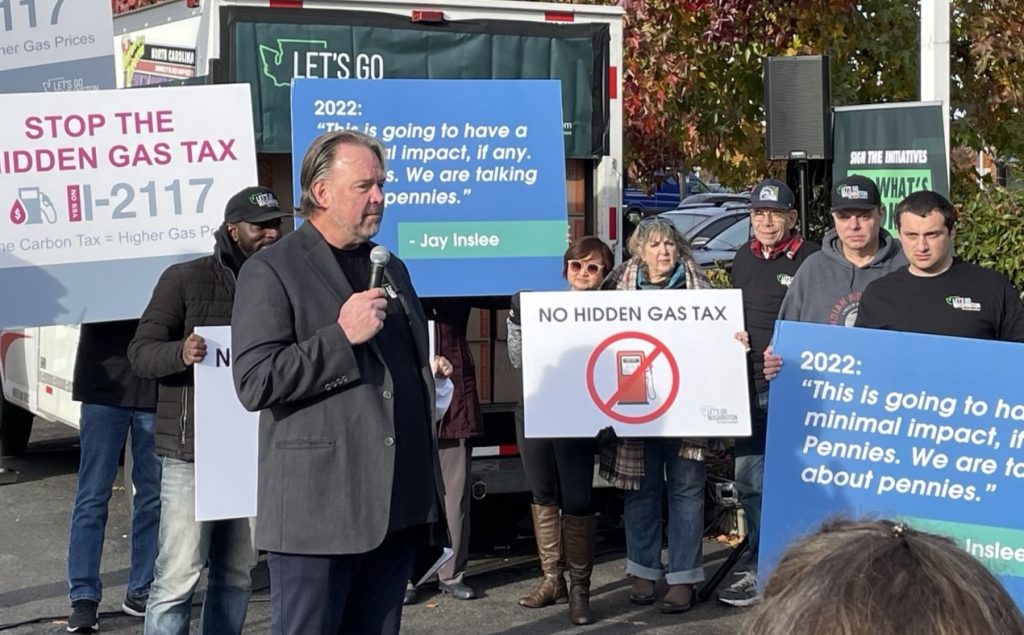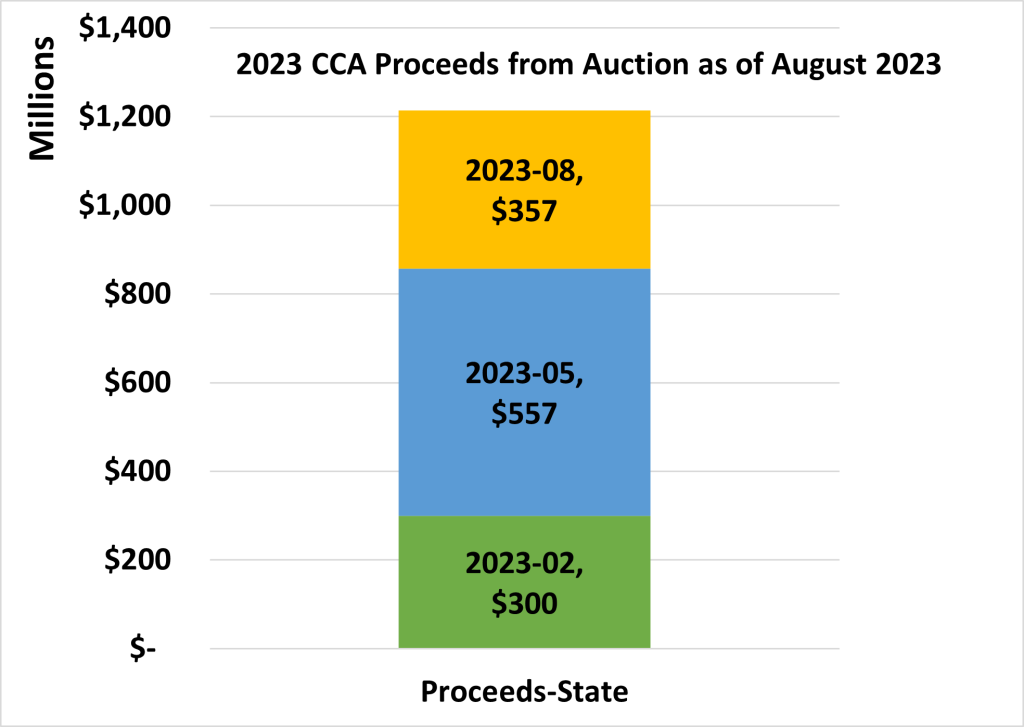KENT, Wash., November 21, 2023—Citizens action group, Let’s Go Washington, announced on November 21, that it has surpassed the signature threshold to submit Initiative 2117, that if enacted into law, will prohibit carbon tax credit trading, also known as “cap-and-invest,” and repeal provisions of the Washington Climate Commitment Act passed by the legislature on April 24, 2021, and signed into law by Governor Jay Inslee on May 17 of that same year.
“We are turning in today, the first set of six initiatives,” Brian Heywood, founder of Let’s Go Washington, announced standing in front of a Shell gas station in Kent. “We have 418,399 signatures that we are turning in.”
Upon the Secretary of State’s Office validation of signatures, it will certify I-2117 for the Legislature in its 2024 session to take one of the following actions:
- Adopt the initiative as proposed resulting in it becoming law without a vote of the people;
- Reject or refuse to act on the proposed initiative resulting in it being placed on the November 5, 2023, General Election ballot; or
- Propose a different measure dealing with the same subject where both measures will be placed on the November 5, 2023, General Election ballot.
Heywood shared that gas prices impact everyone. Having moved to Washington state from California, he experienced firsthand the repercussions when what he calls the legislature becoming completely out of sync of what the everyday person experiences.

“People are just mad…. not because they don’t like it; it’s because they are making a choice between groceries and gas,” Heywood shared with host Brandi Kruse on her Tuesday podcast of unDivided.
He explained to Kruse that the “cap-and-invest” scheme is a money grab by the legislature and a triple hidden tax on Washingtonians.
“First of all you see it in the gas prices [at the pump]… Then if you go and buy groceries, every single thing in a grocery store came on a truck that had to pay this hidden gas tax. Now your eggs, your milk and your cheese prices are up. And then we have the hidden increase in your home heating costs with PSE,” said Heywood.
In 2021, the Washington State Legislature passed the Climate Commitment Act (CCA), which creates a market-based program (called the “cap-and-invest” program) to cap and reduce greenhouse gas emissions, according to the Department of Ecology. To achieve this, the scheme puts a price on greenhouse gas emissions emitted in Washington state increasing the cost to deliver electricity, natural gas, and carbon-based fuels that is forwarded to end-users.
Using a 1990 baseline, CCA seeks to reduce state greenhouse gas emissions 45 percent by 2030, 70 percent by 2040, and 95 percent and achieve net-zero emissions by 2050.
Starting on January 1, 2023, businesses and organizations that emit more than 25,000 metric tons of greenhouse gases a year such as carbon dioxide, were charged a carbon offset fee which is then used to invest in climate projects throughout the state and with the goal to transition Washington to a lower-carbon economy. Affected businesses include fuel suppliers, natural gas and electric utilities, waste-to-energy facilities (starting in 2027), and railroads (starting in 2031).
“It is patently ridiculous to assume the oil companies would just absorb the hit from the governor’s ‘Cap and Gouge’ plan,” wrote Senator John Braun (R-Centralia) in a July press release. “The simple truth is that companies pass increases in their overhead on to their customers through higher prices – just as small business and gig workers pass along increased costs from taxes and regulations to their customers in the form of higher prices.”
A gallon of regular unleaded gas in Washington state cost $3.84 on average the first week of January; as of November 21, that price is $4.431, according to AAA. The National average is $3.295. Washington state currently ranks third in the nation behind California at $4.962 and Hawaii at $4.731.
According to Todd Myers, Environmental Director at the Washington Policy Center, “carbon allowances” comprise 51 cents per gallon as of the latest auction in August. If removed, the average price per gallon in Washington state would drop 13 percent to $3.921.
“Washington’s Climate Commitment Act is the cause of the highest gas prices in the nation and is disproportionately affecting those with lower incomes,” Braun continued.
The cap-and-invest program sets a limit on overall carbon emissions in the state. Businesses emitting more than 25,000 metric tons of greenhouse gases a year are required to obtain carbon allowances equal to their covered greenhouse gas emissions which are purchased through quarterly auctions hosted by the Department of Ecology, or bought and sold on a secondary market. Businesses not complying with the CCA program will be fined up to $50,000 per violation, per day by the Department of Ecology.
The state estimates approximately 75% of statewide greenhouse gas emissions will be covered under this cap-and-invest scheme. As of August, Washington state has received $1.213 billion in revenues from the three greenhouse gas allowance auctions with a fourth auction scheduled for December 6, 2023. An additional $184 million in revenue was collected on behalf of eligible electric and gas utilities to provide credits to customers for increased costs.

On Thursday, December 22, 2022, state regulators approved hundreds of millions of dollars in rate increases for Puget Sound Energy (PSE) electric and natural gas customers that took effect on January 1, 2023. The three settlements address issues around establishing the company’s overall revenue requirement; credits for customers of PSE’s Green Direct program, which provides clean power to corporate and government customers; and the recovery of costs for a portion of the Tacoma Liquified Natural Gas Facility.
PSE is not allowed to profit from the natural gas it purchases for customers, and the Purchase Gas Adjustment (PGA) is the regulatory tool PSE uses to reflect the changing purchase costs of natural gas. In November of 2022, PSE used PGA to implement a 17 percent increase on customers.
In September of 2023, PSE announced that its natural gas customers will see higher rates reflected on their monthly bills, resulting from costs incurred by PSE to purchase allowances to cover greenhouse gas emissions and comply with the cap-and-invest program. On November 1, PSE increased natural gas rates by an overall average of 2.13% percent, to recover costs from January 1, 2023, through September 30, 2023, for the costs to comply with the Cap-and-Invest Program. However, because projected natural gas purchase costs are anticipated to lower, according to PSE, also starting in November, it has lowered overall gas costs to customers by an average of 24.20 percent. PSE is still determining impacts to electric customers.
Currently thirteen states have adopted carbon pricing policies: California, Connecticut, Delaware, Maine, Maryland, Massachusetts, New Hampshire, New Jersey, New York, Rhode Island, Vermont, Virginia, and Washington.
Historically, Washingtonians have overwhelmingly rejected carbon pricing policies—in 2016 with I-732 at 59.25%, and in 2018 with I-1631 at 56.56%. According to the Washington State Public Disclosure Commission, a total of $2.7 million was spent by committees for and against I-732; whereas in 2018, that amount jumped to $47.9 million — $16.42 million in support and $31.58 million against.
If I-1631 would have passed, and assuming emissions would remain at 2019 levels of 102 million metric tons (the latest state reported data according to KING5), from 2020 to the end of 2023, the state would have received $7.344 billion in revenues to fund various environmental projects such as clean energy infrastructure and to increase the resiliency of water and forest resources.
Heywood shared with Kruse that although he is currently receiving vitriol from opponents simply for exercising his free speech rights, he will not be deterred.
“If you are commuting 30, 40, 50 miles a day, this law hits you every single day,” said Heywood.
Let’s Go Washington is currently collecting signatures on five other statewide initiatives which are:
- I-2113: Reasonable Police Pursuit
- I-2124: Opt Out Of State-Run Long Term Care Coverage Act
- I-2109: Repeal the Capital Gains Tax
- I-2111: No State Income Tax
- I-2081: Parental Notification
Residents can sign any or all petitions at one of over 150 locations across the state. In Snohomish County, those locations are the following:
- Family Policy Institute, 16108 Ash Way #107, Lynnwood, WA, 425-608-0242
- Pulse for Health, North Kelsey Street, Monroe, WA
- Sound Loan, Wetmore Ave, Everett, WA
The team at Let’s Go Washington are confident they will get all six statewide initiatives on the November ballot saying that these issues are popular with Washingtonians. The group’s deadline to turn in signatures for the remaining five initiatives is December 29, 2023.
To learn more visit https://letsgowashington.com/, email contact@letsgowa.com, or call 425-403-8185.
Author: Mario Lotmore













9 Responses
It’s natural gas it can’t get any cleaner then clean look at all the volcanoes that are going on. Where is all those gases going? Should they put a tax on God too? I guess if they could they would.